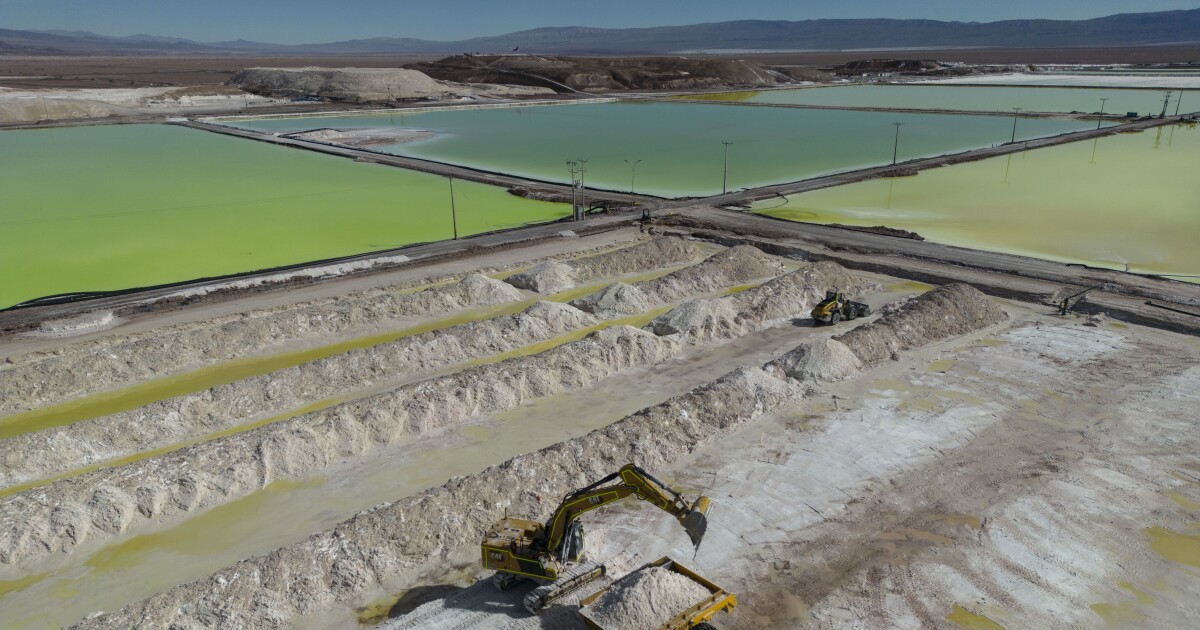

Chinese electric vehicle maker BYD deployed an engineering team to Chile this week to kick-start a massive lithium processing plant, part of a broader investment shift from electric vehicle makers around the world to compete for limited access to critical minerals.
BYD first announced its $290 million investment in April to build out its new lithium carbonate processing facility, slated to be located in the Chilean north. The investment in the new facility is a strategic departure from BYD, which processes the vast majority of its materials in China.
FINAL MOMENTS BEFORE TITANIC SUB IMPLODED REVEALED
The same month, the South American country’s government granted BYD status as a “qualified lithium producer” in the country, giving it access to preferential prices and other strategic benefits not granted to outside investors.
News of the BYD plant, which is expected to start producing lithium iron phosphate for EV cathodes by the end of 2025, comes as Chile and other mineral-rich countries seek to play more of an active role in the processing and manufacturing process, seizing on the opportunity to ensure economic access and gain a foothold in the burgeoning battery industry.
Earlier this year, Chilean President Gabriel Boric announced his country would nationalize its lithium industry as part of an effort to boost the country’s economy and ensure it has a stake in new projects, including more environmental input.
“This is the best chance we have at transitioning to a sustainable and developed economy. We can’t afford to waste it,” Boric said of Chile’s lithium reserves, which are the largest in the world, during a televised address in April.
Other mineral-rich countries such as Argentina have also sought to encourage these types of partnerships, while others, such as Indonesia and Zimbabwe, have enacted policies requiring miners to invest in certain processing capabilities before materials can be exported to their respective countries.
“A lot of countries with the critical minerals have legitimate aspirations to also capture value in the [supply] chain, meaning they don’t just want to produce the lithium and then export it for processing somewhere else,” Tom Moerenhout, a professor and researcher at Columbia University’s SIPA Center on Energy Policy, told the Washington Examiner in an interview.
“They also want to process it at home, which adds jobs for technology and manufacturing,” he added.
The BYD plant, for example, is slated to create around 500 jobs in Chile and will produce 50,000 tons of lithium iron phosphate per year for cathodes once it begins operations in 2025.
The shift to purchasing stakes directly in mining companies, or to secure binding offtake agreements, has also taken off in the United States.
Last year, Ford signed a binding agreement with lithium producer Ioneer to purchase lithium from its Rhyolite Ridge mining project in Nevada, with shipments slated to begin in 2025.
The amount of lithium supplied will help Ford make about 175,000 EV batteries annually for its BlueOval SK joint venture.
And in January, General Motors announced a conditional $650 million investment in Lithium Americas’s Thacker Pass mine in Nevada, giving it exclusive rights to the lithium extracted from the mine once production begins.
The deal is slated to supply GM with enough lithium for 1 million EVs annually.
The agreements are part of a broader recognition within the auto industry that the amount of available EV minerals is shrinking, and fast, as demand for EVs is expected to grow exponentially by 2030.
Though global lithium output is slated to triple this decade, the growth of new EV sales is expected to outpace it widely.
Global demand for lithium batteries is expected to rise fivefold by 2030, according to a report published by the public-private alliance Li-Bridge earlier this year.
CLICK HERE TO READ MORE FROM THE WASHINGTON EXAMINER
Boric, for his part, said the agreement with BYD will help Chile ensure it can protect its environment and share mining benefits with indigenous communities.
The national lithium strategy, he said in April, will build a Chile “that distributes wealth we all generate in a more just way.”





